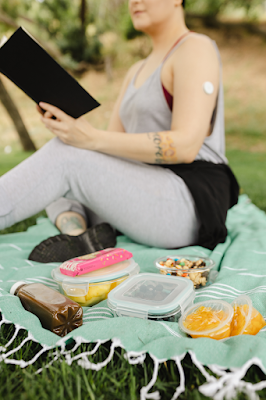What are the odds that someone I knew would die on the 14th of November?
Did I hear you ask what it has to do with anything? I mean people die every day, right?
Well yes, I know! But the 14th of November is World Diabetes Day and the deceased happens to be a distant in-law who actually died from…
Your guess is as good as mine.
And it’s diabetes! Being a Muslim, he was buried the next day. Had a gaping hole in his leg that was leaking blood and already oozing a stench. If he were to be alive, I have no doubt the leg would have to be amputated.
Life is so delicate. One minute you’re there and the next you could be gone.
As I grow older, I become more conscious of my health by all standards. I lost both parents to degenerative diseases and this is why I’m more committed than ever to ensuring that I not only age well but I’m equally mindful of my health.
If you know anyone treating diabetes, then you’re well aware of the fact that it is a lifelong sentence of taking medication. Unfortunately, since it has no cure yet, it can only be managed and this ordeal could be highly demanding. However, to find out if it's possible to reverse diabetes then read the article to the end.
What is diabetes?
Diabetes is a chronic condition that affects the way your body regulates blood sugar (glucose). And since we’ve established that there is no cure for diabetes, it can be managed effectively through lifestyle changes, medication, and insulin therapy.
Normally, insulin helps the body move glucose from the bloodstream into the cells, where it’s used for energy. But in people with diabetes, the body doesn’t make enough insulin, or the body doesn’t use it very well.
This means that too much glucose stays in the bloodstream — and not enough gets into the cells, tissues, and organs. Over time, high blood sugar can cause many different health issues.
However, people living with diabetes can lead a healthy life by controlling their blood sugar levels, eating a balanced diet, engaging in regular physical activity, and taking medications as prescribed.
Sadly I lost my mother in December 2023. She was not only diabetic; she also had Stage 4 breast cancer and anemia. She was a really strong fighter; accommodating all those diseases for years before finally giving up.
I could not begin to imagine the kind of excruciating pain she went through day by day. More than ever, this strengthened my resolve to lead a better life, health-wise. My passion and interest in health and wellness did not start suddenly. It has always been an interest for me at a young age and it continues to fuel my curiosity towards it.
What is the cause of diabetes?
Simply put, it's sugar.
Excess sugar in the brain results in dementia.
Excess sugar in the eyes results in glaucoma.
Excess sugar in the teeth results in cavities.
Excess sugar in the skin results in aging.
Excess sugar in the system results in cancer
Excess sugar in sleep results in insomnia and finally
Excess sugar in the blood results in diabetes.
Urbanization has also gone a long way in causing this problem. Did you know that the country that has the highest rate of diabetes is actually China!
You would think with all their seafood, stir-fries, and healthy dishes, they would be the healthiest nation. It came as a shock when I stumbled across the article that listed them as the top sufferers of the disease.
It did not, however, surprise me that an estimated 1 out of 10 people (over 500 million globally) are living with diabetes and that figure is going to rise exponentially by 2030.
In Nigeria, for example, unhealthy diets top the list of the major causes of diabetes, with the average Nigerian consuming unhealthy amounts of carbonated drinks within a short timeframe. As of 2022, each Nigerian consumed at least 26.22 liters of carbonated drinks in that year. Not to mention the industries producing unhealthy diets, including sugar-sweetened drinks and foods.
The major reason why diabetes is on the rise globally is the intake of refined and processed foods coupled with reduced activity. This dangerous combination has been affecting men, women and children of all ages. We have concluded that diabetes in urban areas results more from lifestyle than genetics. The reverse is the case for rural dwellers.
Types of Diabetes
There are several different types of diabetes. Here are the most common types of diabetes and what causes them:
Type 1 Diabetes
Cause: Autoimmune response where the immune system attacks and destroys insulin-producing beta cells in the pancreas.
Onset: Usually occurs in childhood or adolescence.
Treatment: Requires insulin therapy.
Type 2 Diabetes
Cause: Insulin resistance, where the body's cells do not respond effectively to insulin, and a gradual decrease in insulin production over time.
Onset: Typically develops in adulthood, but is increasingly seen in children and adolescents due to lifestyle factors.
Treatment: Managed through lifestyle changes, oral medications, and in some cases, insulin.
Gestational Diabetes
Cause: Hormonal changes during pregnancy can lead to insulin resistance.
Onset: Develops during pregnancy and usually resolves after childbirth.
Treatment: Dietary changes, monitoring blood glucose levels, and in some cases, medication.
Prediabetes
Prediabetes is a health condition where blood sugar levels are higher than normal but not high enough to be diagnosed as type 2 diabetes. It's considered a middle ground between normal blood sugar levels and diabetes. People with Prediabetes have an increased risk of developing type 2 diabetes, heart disease, and stroke.
Diabetes can lead to various complications if not well-managed, including kidney damage, heart disease and vision problems.
Recommeded: Supplement that supports eye and heart health
TAKE NOTE
Prediabetes and type 2 diabetes are similar and can be reversed by changing some lifestyle habits such as a healthy diet, regular physical activity, and weight loss. For people with Type 2 diabetes, exercise, good nutrition, and weight loss can slow it or even reverse it.
Type 1 diabetes on the other hand cannot be reversed; it can only managed by taking insulin for a lifetime. You could say Type 1 diabetes is more dangerous than type 2. About 5-10% of people with diabetes live with T1D. While about 90-95% of people with diabetes live with T2D.
Both T1D and T2D are chronic health conditions. This means that once you’re diagnosed with diabetes, you will have it for the rest of your life.
How sad!
Woman living with diabetes
Signs that you have diabetes
The following are a few of the signs that your blood sugar is high and you need to do something about it.
- Excessive thirst.
- Extreme hunger.
- Blurry vision.
- Weakness or fatigue
- Constant urination
- Itchy skin
- Skin infections.
What can we do to avoid diabetes?
A lot!
When I start hearing type 1, 2, 3 or stage 4 of any disease, then I wonder if the patient took note when the symptoms began. The best way to handle any ailment is to tackle it as soon as it rears its ugly head.
My father died of a stroke in 2015. He had been nursing high blood pressure shortly after I was born. Precisely 1984. He managed it for a long time by avoiding meat and other starch foods before his death.
The lesson is to actually avoid these diseases; early intervention is really crucial. This is why regular checkups are important.
Is diabetes hereditary?
Now I’m sorry to have to break this to you but if anyone in your family, be it your siblings or parents, had or has diabetes, then you are more likely to get it. You are also more likely to have prediabetes.
What you can do is quickly plan an immediate check-up and talk to your doctor about your family's health history of diabetes. This is why new research and treatments are being looked into due to the high rate of people with the ailment.
Related article: Why you should go for regular checkup.
How to reverse diabetes
Lose extra weight - Remission is more likely if you lose weight as soon as possible after your diabetes diagnosis. Remission is when blood glucose (or blood sugar) levels are in a normal range again. This doesn't mean diabetes has gone for good.
Regular physical activity
Plant-based foods; A Whole-foods diet like whole grains, fruits, vegetables, and nuts with a limited intake of refined foods is highly recommended for preventing and treating type 2 diabetes
Cut sugar and refined carbohydrates from your diet. Eating foods high in refined carbohydrates and sugar increases blood sugar and insulin levels, which may lead to diabetes over time.
Avoid fried foods, salty foods, sugary foods, sweets and beverages with added sugar
Practice portion control.
Aim for 30
Drink water.
Eat fiber and vitamin-rich foods like Beans, dark green leafy vegetables, tomatoes, fish high in omega-3 fatty acids, and nuts.
Recommended: Manage your health with this supplement!
Conclusion
Diabetes is not curable as of now, but it can be prevented. There are no treatments that can make it go away completely. People living with diabetes may need to take medication for life.
Yuletide is around the corner. Before you consider stuffing yourself with unhealthy meals, kindly make the right choices...for the sake of your health. Until then, take care of yourself.




.jpg)
No comments
Post a Comment